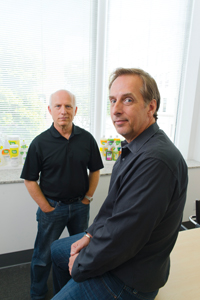CleanWell Challenges Consumer Convention
 Imagine a consumer product world that is no longer at war with germs. One that doesn’t fight to indiscriminately destroy bacteria with toxic synthetic chemicals, but rather, considers health benefits that are inherent in diverse and complex bacterial colonies.
Imagine a consumer product world that is no longer at war with germs. One that doesn’t fight to indiscriminately destroy bacteria with toxic synthetic chemicals, but rather, considers health benefits that are inherent in diverse and complex bacterial colonies.Living in balance with bacteria might seem counterintuitive to a company that makes antimicrobial products, but that is precisely what puts CleanWell Company at the forefront of innovation in its industry. Instead of asking what new synthetic chemicals made in the lab can manipulate this remarkable ecosystem, the San Francisco-based company asks how natural, biological systems protect the integrity of the human body, which is full of hundreds to thousands of species of bacteria collectively called the microbiome.
“CleanWell’s mission is to replace problematic, outdated ingredients found in disinfectants and antibacterial products with plant-based chemistry,” says Dr. Larry Weiss, founder and chief scientist, CleanWell. “We looked at ways that nature could solve the problem rather than creating something entirely new.”
Plant Power
With a growing understanding of bacteria and human health among consumers, most widely acknowledged currently in the consumables and supplements industry in the form of probiotics, CleanWell anticipates dramatic change in its arena and is “poised to radically transform the entire category of consumer antimicrobial products,” according to Dr. Weiss.
The company’s thyme-oil based technology is a patented EPA-registered formulation found in all CleanWell products. In recognition of this botanical breakthrough, the company was awarded an Edison Innovation Award in the Cleaning Solutions category earlier this year.
The company launched its first product — a hand sanitizer — in 2007, which was and continues to be the only botanical alcohol-free hand sanitizer, according to Dr. Weiss. It was also unique at that time because it utilized a spray application.
“We launched with a one-ounce travel spray in a stylish bottle with a flip top,” he relays. “This strategy has worked great for us with millions of bottles visibly used by moms as well as celebrities, like Gwen Stefani and Cameron Diaz.”
In fact, the relatively small consumer goods manufacturer has done a good job attracting a hand sanitizer fan following. It reports to have a 49 percent share of the hand sanitizer category as measured by SPINS, LLC natural channel data.
Beyond Green
CleanWell’s newer line of botanical disinfectants has a green element that clearly distinguishes it from anything currently on the market.
As Dr. Weiss explains, “Green cleaners only clean, they don’t disinfect.” And conversely, traditional disinfectant cleaners use a synthetic active ingredient: quaternary ammonia. “This is a problematic and outdated chemistry that is tied to a variety of human environmental concerns.”
CleanWell disinfectants are the only plant-based cleaner disinfectants on the market that are also EPA-registered disinfectants.
“There is stringent criterion that must be met to get EPA registration,” Dr. Weiss maintains. “This registration process proves that our products are as efficacious at germ-killing as traditional disinfectants.”
Ultimately, CleanWell’s products are “transforming the consumers’ set of expectations for a product that is a green cleaner,” says Dr. Weiss. “There are no compromises and you don’t have to pay more.”
Interestingly, its target consumer set is larger than just a more socially conscious group.
“We’re targeting mainstream consumers who share the universal desire for better, safe products,” says Holly Bornstein, vice president, Brand and Marketing, CleanWell. She adds that the company is not aiming for consumers who are satisfied with the products they are currently using. “We want to get to the moms of young children that are looking to create a safe, germ-free home.” This mother/child relationship is what CleanWell expects to be the crucible of change in the category moving forward.
Social Butterfly
Like most small companies, CleanWell does not have a traditional advertising budget. Rather, it leverages social media, influencers, in-store programs, partnerships and public relations to get its message out.
“This has been great for us. We were among the first to launch social media programs with like-minded brands, which has been an excellent way to get quality exposure for CleanWell,” states Dr. Weiss.
The company’s current Facebook promotion — 180 Days of CleanWell Giveaway! — is the latest campaign to come out of this strategy. The company is giving away a grand prize package of a year’s supply of CleanWell and 10 first prize packages with gifts from Annie’s Homegrown, Laptop Lunches, Lifefactory, Plum Organics and Supergoop.
“This is a great way to introduce our fans to brands that we feel good about,” offers Bornstein.
The companies will do TweetChats together, featuring Dr. Weiss and experts from the partnering companies. One will be called “Healthy Lunches” during which Dr. Weiss will talk about the benefits of using CleanWell products in schools. For example, school tables normally have to be wiped down with water after using cleaning products, but that is not the case with CleanWell’s products, which do not need to be wiped away after application.
Beyond like-minded marketing partnerships, CleanWell integrates social media “into every aspect of our process from product development to post-launch product assessment,” says Dr. Weiss. Specifically, this includes product intelligence, insights and recommendations on where to buy products.”
“Our social media presence conveys the intimacy and transparency that we are trying to create with consumers — it’s a give-and-take feel,” adds Bornstein. “Consumers are willing and enthusiastic to talk directly to us, especially to Dr. Weiss. They love having a doctor accessible to answer their questions.”
Recently, the company utilized social media in the new product launch of its Botanical Fabric Deodorizer. In a product-brainstorming meeting, one of CleanWell’s research scientists presented a deodorizing spray for “stinky shoes” inspired by the CleanWell Running Group. She called this beta version, “shoe stink b gone.” A marketing executive took a picture of the beta product and then posted it on Facebook, receiving an enthusiastic reaction.
“Based on category and in-market analysis and consumer discontent with existing offerings, we expanded the usage occasions for the product beyond just shoes to pet areas, furniture, athletic clothing, etc. and developed a Fabric Deodorizer,” Dr. Weiss explains.
After further developing the product and scent, CleanWell recruited Facebook fans to test the product. At launch, it did a series of posts on Facebook, Twitter and in its company newsletter.
“Highlighting the early involvement of our fans in the product development process allowed them to see how integrally involved they were in our process,” says Dr. Weiss. “Now that the product is in market, we do a monthly survey with purchasers.”
On a more macro level, CleanWell utilizes a variety of social media analysis tools and evaluates the findings to:
- Understand what resonates most strongly
- Get a nuanced psychographic profile of its consumer
- Test and evaluate product and brand positioning
- Assess different social media outlets and their relative value given th
- e target consumer
Growing Forward
So where does CleanWell grow from here?
“We have an important message to get out,” Dr. Weiss affirms. “We’ll continue to look for like-minded brand and non-profit partners to help us in our education efforts, and we’ll continue to develop great products with consumer insights ‘baked in’ that feature our patented botanical chemistry.”
As the company grows, it also expects to move beyond social media into more traditional marketing avenues because “the two pieces tie nicely together,” says Bornstein.
For other consumer goods companies that must evolve their innovation efforts to meet the needs of an increasingly health and ingredient label-conscious consumer, Dr. Weiss first reminds them that “these are great consumers. They are intelligent, inquisitive and ask excellent questions.”
He advises others to listen in order to understand what is important to them. “It will greatly inform all you do,” he says. “Ensure that everyone in your organization has a connection to the consumer. In our case, our leadership team members regularly read the consumer e-mails that we get.”
Dr. Weiss actually refers to these e-mails as consumer “love letters”. He explains that one of the company’s customer support team members used to work for a “very large and beloved national brand” in a high-involvement category. “She can’t get over how effusive our CleanWell consumers are about us and what we do,” he says. “We love it, and know we are on the right track.”
The First Consumer

If it were not for a Canadian boy named Conor, born with a severe immune system disorder, there wouldn’t be a company named CleanWell today. Shortly after his birth, Conor’s parents began searching for household disinfectants and antiseptic soaps they could be comfortable using in their home. They came up empty and realized they’d have to create a solution themselves. Conor’s father, Sam DeAth, started investigating alternatives to disinfecting agents found in everyday cleaning products so that his son could live his best life. His research led to the development of the patented EPA-registered formulation found in all CleanWell products: Thyme oil-based technology.
In 2005, Dr. Larry Weiss, a Stanford-trained physician and expert in natural chemistry, discovered that DeAth had cracked the code on how to use a botanical ingredient to kill germs that met regulatory disinfecting requirements. Shortly thereafter, Dr. Weiss, in partnership with DeAth, launched CleanWell and brought the botanical cleaning products that drastically improved Conor’s life to the mainstream consumer.
As for Conor, today he is 16, and even though he still struggles with his condition, he excels at skiing, continues to confound his doctors, and enjoys a normal life with his family and friends.
